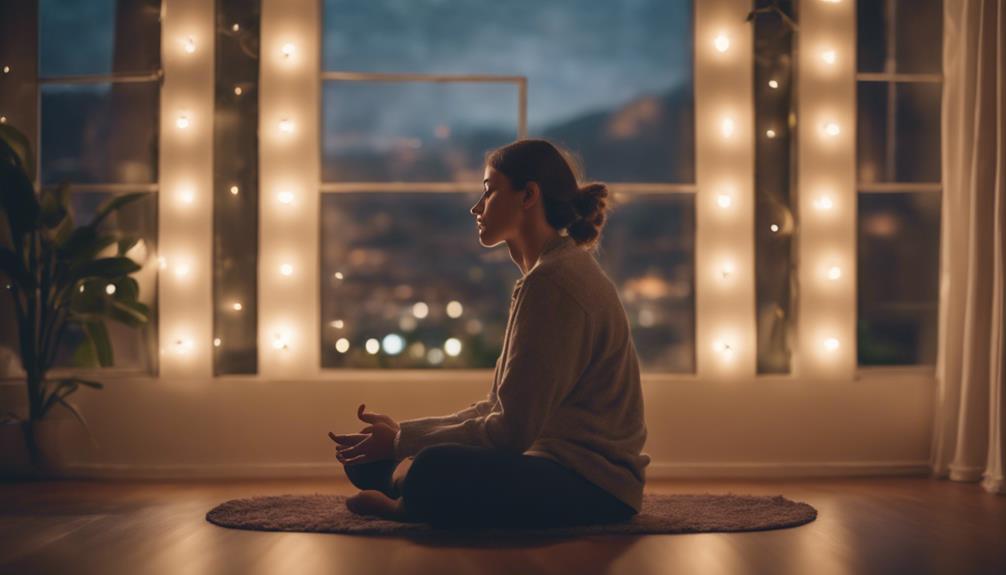
Discover powerful hypnotherapy techniques designed to manage stress effectively. Deep relaxation methods incorporate guided imagery and calming suggestions to lower stress hormones. Visualization practices use the mind's ability to promote positivity and mental well-being, aiding in coping with daily stressors. Positive affirmations combat negative beliefs, fostering self-worth and reducing stress levels. Relaxation techniques like progressive muscle relaxation and mindful breathing enhance body awareness, reduce anxiety, and build resilience. Additional strategies like guided imagery, self-hypnosis, and hypnotic suggestions lead to profound relaxation and emotional balance. Explore these techniques for a transformative journey towards inner peace and stress relief.
Key Takeaways
- Deep Relaxation Techniques induce calmness and lower stress hormones.
- Visualization Methods foster mental wellness and aid in stress release.
- Positive Affirmation Approaches reduce stress levels and rewire negative beliefs.
- Relaxation Techniques like Progressive Muscle Relaxation enhance body awareness and reduce stress symptoms.
- Additional strategies include Guided Imagery Sessions and Self-Hypnosis for sustained stress relief.
Deep Relaxation Hypnosis
Deep Relaxation Hypnosis is an important technique that fosters profound relaxation through guided imagery and therapeutic suggestions, offering a sanctuary for the mind and body to unwind and rejuvenate. This method involves deep breathing, muscle relaxation, and visualization to induce a state of calmness and tranquility. One significant benefit of deep relaxation hypnosis is its ability to lower cortisol levels, the hormone associated with stress. By reducing cortisol levels, this technique can help alleviate physical tension, decrease heart rate, and promote overall well-being.
Guided imagery plays a vital role in deep relaxation hypnosis. Through vividly describing peaceful and serene scenes, the mind is transported to a tranquil space, allowing for deep relaxation to take place. This visualization technique enhances the hypnotic experience, making it more effective in reducing stress and promoting relaxation.
Furthermore, deep relaxation hypnosis accesses the subconscious mind during the hypnotic state, promoting a sense of inner peace and tranquility. Regular practice of this technique can not only improve sleep quality but also boost resilience to stressors, ultimately leading to a more balanced and harmonious state of being. Embracing deep relaxation hypnosis as a part of a stress management routine can provide individuals with a powerful tool to combat the pressures of daily life and cultivate a peaceful mindset.
Visualization Techniques
Visualization techniques in hypnotherapy harness the power of the mind to create a tranquil and positive mental state, facilitating relaxation and stress reduction. When individuals engage in visualization exercises, they immerse themselves in calming imagery, allowing them to escape the pressures of daily life and find inner peace. By focusing on serene scenes or scenarios, the mind can let go of tension, promoting a sense of well-being and tranquility.
- Visualizing peaceful environments or experiences aids in releasing stress and promoting relaxation.
- These techniques leverage the mind's ability to create a positive mental state, enhancing stress management practices.
- Regular incorporation of visualization exercises can notably improve overall mental wellness and help individuals cope with daily stressors more effectively.
Through the practice of visualization techniques, individuals can redirect their thoughts away from stress-inducing factors, fostering a deep sense of calmness. By incorporating these practices into their daily routine, individuals can enhance their ability to manage stress and cultivate a more peaceful state of mind.
Positive Affirmation Therapy

Incorporating positive affirmation therapy into hypnotherapy sessions offers individuals a transformative approach to counter negative beliefs and alleviate stress. Positive affirmations involve the practice of repeating uplifting statements to challenge and overcome pessimistic thoughts, ultimately leading to a reduction in stress levels. Research indicates that the use of positive affirmations can rewire the brain, fostering feelings of self-worth and fortitude against various stressors that individuals may encounter in their lives.
Moreover, personalized affirmations tailored to the specific needs of individuals can be a potent tool in stress management. By crafting affirmations that resonate with the individual's core beliefs and aspirations, hypnotherapists can help their clients cultivate a more positive mindset and outlook on life. Consistent practice of these personalized affirmations during hypnotherapy sessions has the potential to bring about significant shifts in one's thought patterns and emotional responses, contributing to a tangible decrease in stress over time.
Progressive Muscle Relaxation
A widely recognized stress management technique, Progressive Muscle Relaxation involves the deliberate tensing and subsequent relaxing of various muscle groups in the body. This method is known for its effectiveness in reducing muscle tension, promoting relaxation, and alleviating physical symptoms of stress. Through the systematic engagement and release of muscle groups, Progressive Muscle Relaxation enhances body awareness and induces a state of calmness.
- Promotes Relaxation: By consciously tensing and then relaxing different muscle groups, this technique helps the body release built-up tension, leading to a sense of deep relaxation.
- Enhances Body Awareness: Progressive Muscle Relaxation encourages individuals to focus on specific muscle groups, promoting a heightened awareness of bodily sensations and tension.
- Reduces Stress Symptoms: Regular practice of this technique can notably reduce stress and anxiety levels, improving overall well-being and mental clarity.
Whether practiced independently or guided by a therapist, Progressive Muscle Relaxation is a valuable tool for managing stress and enhancing relaxation. Its effectiveness in reducing stress and anxiety makes it a popular choice for individuals seeking natural and holistic approaches to stress relief. By incorporating this technique into your routine, you can experience the benefits of improved relaxation and a calmer state of mind.
Mindful Breathing Exercises

Mindful breathing exercises offer a powerful way to cultivate calm and presence amidst life's challenges.
By focusing on the breath, individuals can tap into a source of inner peace and tranquility.
These techniques provide a simple yet profound tool for managing stress and fostering overall well-being.
Benefits of Breathing
Focusing on the breath to bring attention to the present moment can be a crucial technique for promoting relaxation and reducing stress. Mindful breathing exercises, such as deep breathing techniques, play an essential role in stress management by lowering stress hormones, reducing anxiety, and enhancing emotional well-being.
Research indicates that mindful breathing can boost mental clarity, decrease negative thoughts, and build resilience to stress over time. Engaging in deep breathing exercises for a few minutes each day can help regulate the body's stress response and enhance stress management skills.
Additionally, mindful breathing serves as a portable and accessible tool for stress relief, offering a way to cultivate a sense of calm and balance anytime, anywhere.
Techniques for Relaxation
Incorporating relaxation techniques like mindful breathing exercises can greatly enhance one's ability to manage stress and improve overall well-being. Mindful breathing exercises involve focusing on breath sensations to anchor attention in the present moment. These techniques are known to promote relaxation, reduce stress levels, and enhance mental clarity.
Stress Reduction Hypnotherapy
Starting on a journey towards stress reduction through hypnotherapy can be a transformative experience.
By integrating deep relaxation techniques, positive affirmations for calm, and visualization practices into sessions, individuals can access their inner strength to combat stress.
This approach offers a powerful tool to reprogram the mind, paving the way for a more peaceful and resilient mindset.
Deep Relaxation Techniques
To induce a profound sense of calmness and tranquility, deep relaxation techniques are utilized in stress reduction hypnotherapy through the power of hypnotic suggestions. These techniques aim to release tension, lower cortisol levels, and promote inner peace and well-being.
Hypnotherapy for deep relaxation often includes:
- Guided imagery
- Progressive muscle relaxation
- Breathing exercises
Positive Affirmations for Calm
Deepening the sense of relaxation and tranquility achieved through deep relaxation techniques, positive affirmations play a vital role in stress reduction hypnotherapy by reshaping the subconscious mindset towards calmness and resilience.
Positive affirmations in stress reduction hypnotherapy involve repetitively stating calming phrases to rewire the subconscious mind, fostering peace, relaxation, and confidence during sessions. These affirmations counter negative self-talk, promoting a state of calmness and reducing the impact of stress on mental and emotional well-being.
Visualization for Stress Relief
How can visualization techniques in stress reduction hypnotherapy help individuals cultivate a sense of inner peace and well-being amidst daily stressors?
Visualization plays an essential role in hypnotherapy for stress relief by allowing individuals to envision peaceful scenarios or positive outcomes that promote relaxation and diminish tension. This powerful tool aids in creating mental images that evoke feelings of calmness and well-being, effectively managing stress levels.
Through research, it has been demonstrated that visualization in hypnotherapy can enhance relaxation responses, reduce stress hormones, and enhance overall mental well-being. By engaging in visualization exercises during hypnotherapy sessions, individuals can reprogram their subconscious mind to respond positively to stress triggers, ultimately leading to a more relaxed state.
- Enhances relaxation responses
- Reduces stress hormones
- Improves mental well-being
Guided Imagery Sessions
In hypnotherapy, guided imagery sessions harness the power of vivid mental images to promote relaxation and alleviate stress. By guiding individuals through peaceful scenes and positive emotions, these sessions help calm the mind and body, offering a powerful tool for stress reduction. Research indicates that engaging in guided imagery can effectively reduce anxiety, enhance mood, and contribute to overall well-being.
During guided imagery sessions, participants are encouraged to immerse themselves in detailed mental landscapes, utilizing all their senses to evoke a profound sense of tranquility. This process enables individuals to shift their focus away from stressors towards more soothing and calming experiences, fostering a deep sense of relaxation. The utilization of guided imagery in hypnotherapy aims to instill a lasting sense of calm, enhance emotional resilience, and facilitate inner healing.
Self-Hypnosis for Stress Relief

Starting on a journey of self-hypnosis for stress relief opens up a world of personal empowerment and inner peace. By harnessing the power of your mind through positive affirmations and visualization techniques, you can cultivate a sense of calm and resilience.
Let's explore the benefits, steps, and tips for effective self-hypnosis to help you navigate the path towards a stress-free mind and body.
Benefits of Self-Hypnosis
Utilizing self-hypnosis as a tool for stress relief empowers individuals to cultivate personalized relaxation techniques through affirmations and visualizations. Self-hypnosis not only promotes stress reduction but also allows individuals to practice mindfulness independently, enhancing overall well-being and emotional balance.
Daily self-hypnosis sessions can lead to sustained stress relief and improved coping mechanisms, providing a sense of control over one's mental state. Body scan techniques in self-hypnosis help individuals focus on relaxation and tension release in different areas of the body, contributing to a holistic sense of calm.
Incorporating breathing meditation during self-hypnosis anchors attention to the present moment, effectively reducing stress and anxiety levels.
Steps to Self-Hypnosis
Engage in a state of deep relaxation and focused attention to initiate self-hypnosis for effective stress relief techniques. Self-hypnosis involves creating a peaceful environment, closing your eyes, and concentrating on calming your mind and body.
Begin by taking slow, deep breaths and releasing any tension you may be holding. Utilize guided self-hypnosis audios that offer positive affirmations and visualizations to deepen the experience. These audios can enhance the effectiveness of your self-hypnosis practice for stress management.
Incorporate progressive muscle relaxation and breathing exercises into your self-hypnosis sessions to further reduce stress levels. By committing to learning and practicing self-hypnosis, you empower yourself to take charge of your stress response and nurture your overall well-being.
Tips for Effective Self-Hypnosis
To achieve maximum benefit from self-hypnosis for stress relief, it is essential to cultivate a tranquil and focused mental state conducive to relaxation and rejuvenation. Incorporating the body scan technique, breathing meditation, and visualization exercises can enhance the effectiveness of your self-hypnosis practice:
- Body Scan Technique: Focus on progressively relaxing each muscle group, releasing tension, and promoting a sense of calmness.
- Breathing Meditation: Use deep breathing techniques to anchor your attention to the present moment, fostering relaxation and reducing stress.
- Visualization Exercises: Imagine peaceful scenes or positive outcomes to promote relaxation and alleviate stress.
Hypnotic Suggestions for Calmness

In hypnotherapy sessions focusing on calmness, individuals are gently guided towards a state of profound relaxation and tranquility. Through the power of hypnotic suggestions, stress relief becomes attainable as the mind is led to a place of inner peace and emotional balance. These suggestions are carefully crafted to promote a deep sense of calmness and serenity, allowing individuals to experience a reprieve from the pressures of daily life.
During sessions, hypnotic suggestions for calmness often involve visualizations of peaceful scenes, such as serene landscapes or gentle waves lapping at the shore. Positive affirmations are also utilized to reinforce feelings of tranquility and well-being. The subconscious mind is particularly receptive to these suggestions, making them effective tools for reprogramming ingrained patterns that may contribute to stress and emotional turmoil.
Hypnotherapy for Sleep and Relaxation
Inducing a state of deep relaxation through hypnotherapy can be a transformative approach to enhancing sleep quality and promoting overall relaxation. Hypnotherapy techniques focus on addressing underlying stressors and promoting relaxation through subconscious suggestions, leading to improved sleep patterns. Deep relaxation techniques utilized in hypnotherapy sessions help individuals achieve a calm state that is conducive to better sleep quality.
In the domain of hypnotherapy for sleep and relaxation, there are specific approaches that can be beneficial:
- Hypnosis for sleep involves inducing a trance-like state to reframe negative thoughts and encourage restful sleep.
- Hypnotherapy targets various sleep issues such as insomnia, nightmares, or restless sleep by delving into the root causes of stress.
- Utilizing self-hypnosis audios before bedtime is a practical tool to enhance relaxation, mitigate stress, and ultimately improve overall sleep quality.
Frequently Asked Questions
What Are the Five Stress Management Techniques?
Breathing exercises, mindfulness meditation, and engaging in physical activity are three effective stress management techniques.
By practicing deep breathing, individuals can promote relaxation and calmness.
Mindfulness meditation encourages being present in the moment, fostering awareness and acceptance.
Physical activity, such as exercise or yoga, can help release tension and reduce stress levels.
Incorporating these techniques into daily routines can contribute to improved well-being and stress management.
How Can Hypnotherapy Help With Stress?
Hypnotherapy offers a transformative approach to stress management by harnessing the power of the mind. Through relaxation techniques, mindfulness practices, and cognitive restructuring, it helps individuals cultivate coping strategies for stress.
Visualization exercises and self-hypnosis techniques are utilized to reprogram the subconscious, fostering healthy responses to stress triggers. By addressing negative thought patterns, hypnotherapy empowers individuals to achieve long-lasting stress relief and enhance overall well-being.
What Are the 4 A's of Stress Management?
The 4 A's of stress management – Avoid, Alter, Adapt, and Accept – provide a thorough framework for effectively handling stress triggers.
By recognizing and avoiding unnecessary stressors, altering the situation causing stress, adapting responses, and accepting what cannot be changed, individuals can develop coping strategies to navigate stressful situations.
Mindful breathing techniques can also be integrated into these strategies to promote relaxation and emotional regulation during challenging moments.
How Does Hypnotherapy Treat Anxiety?
Anxiety relief through hypnotherapy involves accessing the subconscious mind to reframe negative thought patterns, promoting stress reduction and mental well-being.
By targeting root causes of anxiety, personalized hypnotherapy sessions instill calmness and confidence through visualization techniques and positive affirmations.
This holistic approach addresses emotional distress effectively, creating lasting changes in behavior and perception.
Hypnotherapy benefits individuals by inducing deep relaxation and offering a powerful tool for managing anxiety.
Conclusion
To sum up, implementing hypnotherapy techniques can be a powerful tool for managing stress. Research has shown that 85% of individuals who undergo hypnotherapy experience a significant reduction in stress levels.
By incorporating practices such as deep relaxation hypnosis, visualization techniques, and positive affirmation therapy, individuals can effectively alleviate stress and improve overall well-being.
Embracing these techniques can lead to a more peaceful and balanced life.





